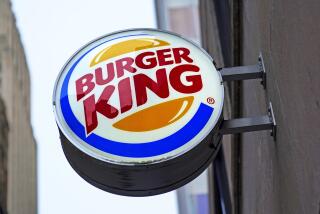Keeping the Copycats From Scratching Your Business
- Share via
Federal law, designed to keep competition in commerce honest and fair, prohibits the deceptive marking, packaging or marketing of goods or services. So one company can’t put soda in a can that looks like a Coca-Cola can and try to win customers by confusing them.
Under the name “trade dress infringement,” the law also allows one company to sue another when “there is a likelihood of confusion resulting from the total effect of (a product’s) package on the eye and mind of an ordinary purchaser.”
But as with most areas of law, creative lawyers have stretched the legal definitions. In recent years, courts have responded by broadening the protection afforded under trade-dress cases from mere packaging to the total visual image of a service or product.
For example, Fuddruckers, an upscale national hamburger chain with a distinctive design and service, sued a Phoenix restaurant on the ground that the competitor had copied its decor, menu, layout and style of service. The legal theory is that consumers will be confused and will eat at the imitation restaurant in the mistaken belief that it is affiliated with Fuddruckers. Not only does that take current customers away from Fuddruckers, or so goes the theory, but customers may not return to Fuddruckers if the imitation restaurant isn’t any good.
In this case, the jury found that the competitive restaurant, Docs B.R. Others, did not infringe the rights of Fuddruckers, but the 9th Circuit U.S. Court of Appeals ordered a new trial because of erroneous jury instructions.
In order to win a case of this type, Fuddruckers has to show that its “trade dress” is nonfunctional, has acquired a secondary meaning and that there is a likelihood of consumer confusion as to source. That’s how judges and lawyers explain it anyway.
In more simple English, the restaurant has to prove that its decor, menu, design and style serve more than functional purposes (are not used only because they have to be used to serve the product) and that the public now associates the style and design with Fuddruckers as its source--which lawyers call establishing secondary source meaning.
Finally, and perhaps most important, the restaurant chain has to show that customers will be confused and mistakenly believe that the other restaurant is affiliated with Fuddruckers. (I bet that Flakey Jakes, a similar hamburger chain, will be watching the trial, assuming the case isn’t settled, with more than mild interest.)
Although the law may offer protection for the total visual feel or concept, that doesn’t mean that businesses are prohibited from selectively copying some aspects from a competitor. For example, Fuddruckers uses director’s chairs, white tile, an open bakery, serves iced tea out of a 32-gallon container that looks like a garbage can and has its food-preparation areas open to the public. As the appeals court explained, the law does not “preclude other restaurants from using those items. It can only prevent competitors from using the items in a way that, viewed as a whole, is likely to confuse consumers.”
Trade-dress infringement is a complicated area of law, with many seemingly inconsistent interpretations by individual judges. If you think a competitor has gone too far, or you want to know how far you can go, you should consult an attorney experienced in trademark and unfair-competition litigation.
No doubt McDonald’s has retained just such a person. The fast-food chain recently became embroiled in litigation with Quality Inns, which is about to launch a low-price hotel chain called McSleep.
Legal Brief
The Legal Aid Foundation of Los Angeles is operating an information telephone line for earthquake victims who have been evicted from rental housing. A three-minute recorded message in both English and Spanish advises callers how to apply for emergency assistance, how to get a building inspected and how to seek return of rental payments and security deposits, among other things. The English number is (213) 252-3900. Call (213) 252-3901 to hear the Spanish-language version.
Attorney Jeffrey S. Klein, The Times’ senior staff counsel, cannot answer mail personally but will respond in this column to questions of general interest about the law. Do not telephone. Write to Jeffrey S. Klein, Legal View, The Times, Times Mirror Square, Los Angeles 90053.
More to Read
Inside the business of entertainment
The Wide Shot brings you news, analysis and insights on everything from streaming wars to production — and what it all means for the future.
You may occasionally receive promotional content from the Los Angeles Times.










